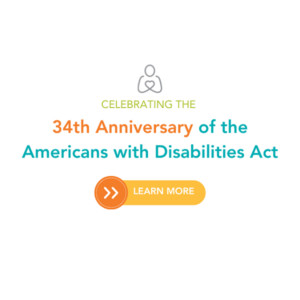
Updated in March 2025
March is Brain Injury Awareness Month, an opportunity to shed light on an often-misunderstood and overlooked issue: living with a brain injury.
A brain injury is damage to the brain that impacts an individual’s day-to-day functioning in some way. These injuries can have profound and lasting effects for both individuals and their families and communities.
As a nonprofit that provides individuals living with traumatic brain injuries with a way to engage in trusted medical fundraising, recognizing Brain Injury Awareness Month is an important part of supporting our community.
In this post, we’ll explain the significance of Brain Injury Awareness Month, challenge myths about life with a brain injury, and explain how to find traumatic brain injury financial assistance for yourself or someone you care about.

The Importance of Brain Injury Awareness Month
Our friends at the Brain Injury Association of America (BIAA) are the leading organization recognizing Brain Injury Awareness Month every March. Since the 1980s, with campaigns like #ChangeYourMind, the BIAA has raised awareness and fostered support for those affected by brain injuries.
This annual observation is a time to raise awareness, increase support, and advocate on behalf of individuals and families facing the challenges of brain injury recovery.

What To Do During Brain Injury Awareness Month
There are many ways to participate in Brain Injury Awareness Month.
If you are someone affected by a brain injury, individually or through someone in your community, you can engage with this awareness month in any way that feels right to you.
That could mean creating content or art to raise awareness and speak about your experiences, sharing your brain injury fundraising campaign, or amplifying the voices of others in the brain injury community.
You may also choose not to recognize or celebrate this awareness month. How you participate is up to you.
For individuals not directly impacted by brain injury, here are a few ways to participate:
- Share social media content about Brain Injury Awareness Month and the impact of a brain injury
- Amplify the voices of content creators living with a brain injury
- Fundraise for or donate to an organization like Help Hope Live that helps individuals and families living with a brain injury
- Learn more and educate others about life with a brain injury—you can start with our list of myths below.

3 Myths About Living with a Brain Injury
Challenging myths and misconceptions about brain injuries is a powerful way to participate in Brain Injury Awareness Month.
Here are three big myths that surround life with a brain injury.

“You don’t have a brain injury. People with brain injuries are…”
The term “brain injury” is broad and represents a wide range of experiences and diagnoses.
Every brain is different, and so is every brain injury. To be an ally, don’t assume you can tell just by sight or by symptom if someone has a brain injury and how the diagnosis will impact them.

“Living with a brain injury means a lifetime of no independence.”
Some individuals with traumatic brain injuries will rely on others for day-to-day care, mobility, and other sources of support. That doesn’t mean individuals living with a brain injury are doomed to a life with no independence.
Many individuals living with a brain injury transition from more intensive care to more independent living pathways with help from training, rehabilitation, home modifications, accessibility gear, and mobility equipment.
Others may find independence through other pathways, whether through assisted communication devices or new hobbies and pursuits.
One way to fight back against this myth is to never assume that someone with a brain injury is dependent and can’t do anything without help.
You wouldn’t push someone’s wheelchair without asking them first, right? Give individuals living with a brain injury the same consideration, and only help when you’re asked to do so by the individual or someone they’ve entrusted to assist with their care.

“Full recovery from a brain injury means being the same person you were before the injury.”
It may seem comforting to tell someone with a brain injury that their life will return to normal or that they’ll be their old selves again in no time. A narrow view of recovery can make individuals feel isolated and silenced instead of comforted.
In addition to the challenges they face, someone with a brain injury may discover or cultivate some new traits, too, from resilience to independence to allowing others to help to greater emotional openness.
Every brain injury recovery process looks different. Emotional, physical, and spiritual healing may be lifelong and change from day to day and year to year.
Let that process evolve and give individuals living with brain injuries a space in which they can share these experiences—even if their recovery is not linear, and even if they never “get back to their old self” again.

The Cost of Life with a Brain Injury
Key costs associated with a brain injury include immediate medical care, ongoing rehabilitation, medical travel, caregiver costs, medical travel, home modifications, accessible transportation, home health equipment, medications, and more.
In-hospital care alone for a brain injury can cost between $2,000 and over $400,000 depending on severity—and insurance never covers every medical and related expense.

Get Brain Injury Financial Assistance – Fundraising & More
For individuals and families facing the aftermath of a brain injury, access to resources and support is a critical lifeline—whether the injury has just occurred or still has an impact years or decades later.
Some key resources may not be financially feasible without assistance.
That’s why our nonprofit is here to provide trusted medical fundraising for brain injuries and other life-impacting diagnoses.
You can get brain injury financial assistance by starting a medical fundraising campaign with Help Hope Live—or share our nonprofit with someone you know who is struggling with brain injury medical and related expenses.
We also include brain injury resources in our Catastrophic Injury Resource Directory. Use and share these resources to make a difference—for yourself or someone you care about.
Written by Emily Progin










